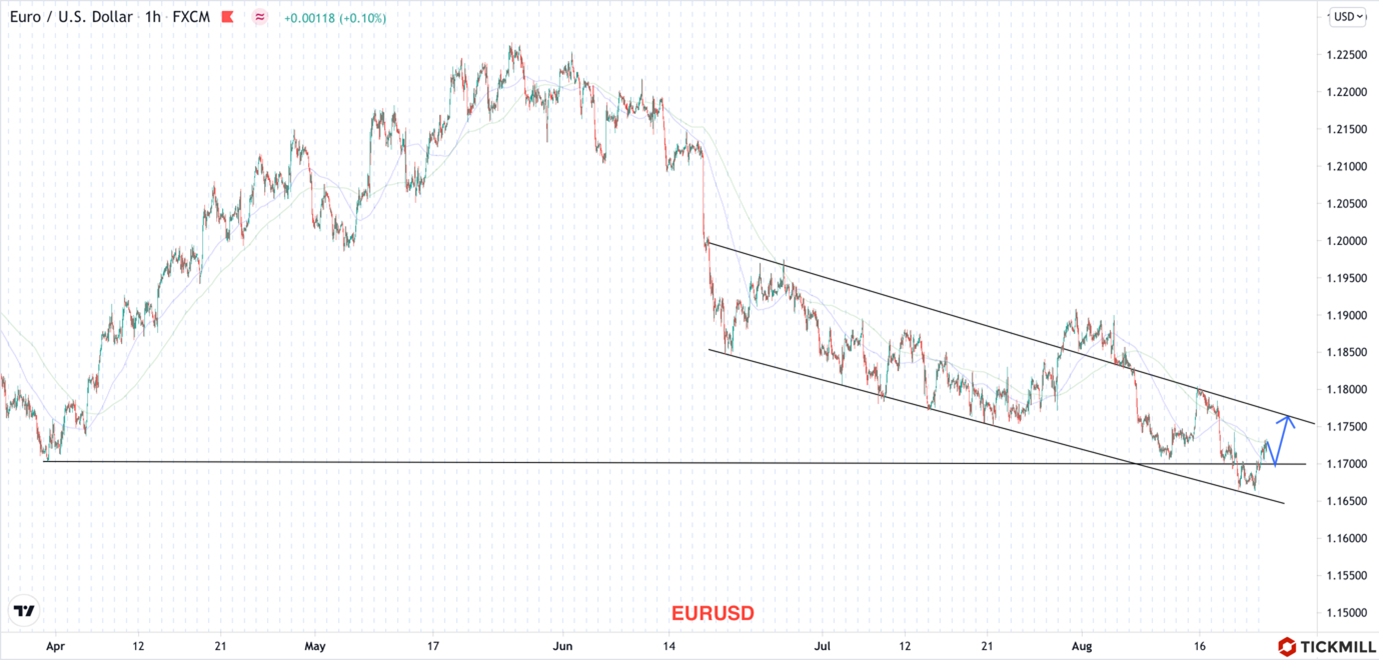The Rebound of EURUSD may be Short-lived as Fed Powell speech is Ahead

Oil prices escape the grip of sellers and stage rebound on Monday after spending almost entire last week in correction. Equity markets rebounded as well which drove sell-off in USD as risk-off flows ebbed. Long-dated bond demand eased in top economies as risk appetite appears to be on the mend.
Last Friday, Fed representative Robert Kaplan said he may reconsider his call to wind down QE early, as the delta variant has shifted the trajectory of the economic recovery to a less favorable one.
There is slight but growing risk that the Fed may disappoint market hawks this week signaling about prolonged QE. The RBNZ was unable to raise rates last week, citing a slowdown in the economy due to the new lockdown. Weak economic data for July, in particular inflation and retail sales, thwarted the Bank of England's plans to tighten policy. Other central banks have also softened their rhetoric somewhat in recent times.
Strong Korean data and Thailand's covid data have drawn investors into Asian equities. In addition, Chinese stocks have also gone up, which has not happened often lately. The Central Bank of China continues to set the USDCNY reference rate below 6.50, which indirectly supports other EM currencies.
The news that Yellen supported Powell's candidacy as head of the Fed for the next term could also have a positive impact on the markets. Given how Powell is smoothing out the position of fellow hawks in the shop, the extension of his term will definitely positively affect the chances of a longer withdrawal of the Fed from soft credit conditions.
Eurozone business activity has remained strong this month, although it has declined from its 20-year high in July. The data released on Monday came slightly worse than expected, which, however, did not prevent the euro from strengthening against the dollar. Markit noted that the economy maintained impressive momentum in the third quarter, with supply chain delays continuing to curb expansion. It also suggests that firms have not yet finished raising prices in response to rising costs, which bodes well for short-term inflation outlook.
The euro was encouraged by the dynamics of the employment sub-index, which remains at a record level for the second month in a row (56.1 points in August).
The main source of volatility this week should be Powell's speech at the Jackson Hole conference in Wyoming, USA. It is unlikely that equities will be able to develop today's rebound closer to the meeting, as the uncertainty about Powell's remarks is very high. The positions of other Central Banks also add contradictions. Dollar buyers are likely to be found with the dollar index (DXY) at 93.20 while EURUSD should face stiff resistance near 1.1750 this week as the pair develops rebound from a downtrend line as breach of April support level failed to sustain:

Disclaimer: The material provided is for information purposes only and should not be considered as investment advice. The views, information, or opinions expressed in the text belong solely to the author, and not to the author’s employer, organization, committee or other group or individual or company.
Past performance is not indicative of future results.
High Risk Warning: CFDs are complex instruments and come with a high risk of losing money rapidly due to leverage. 72% and 73% of retail investor accounts lose money when trading CFDs with Tickmill UK Ltd and Tickmill Europe Ltd respectively. You should consider whether you understand how CFDs work and whether you can afford to take the high risk of losing your money.
Futures and Options: Trading futures and options on margin carries a high degree of risk and may result in losses exceeding your initial investment. These products are not suitable for all investors. Ensure you fully understand the risks and take appropriate care to manage your risk.
